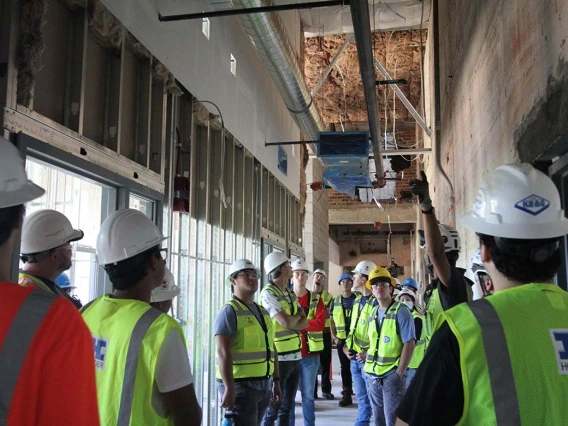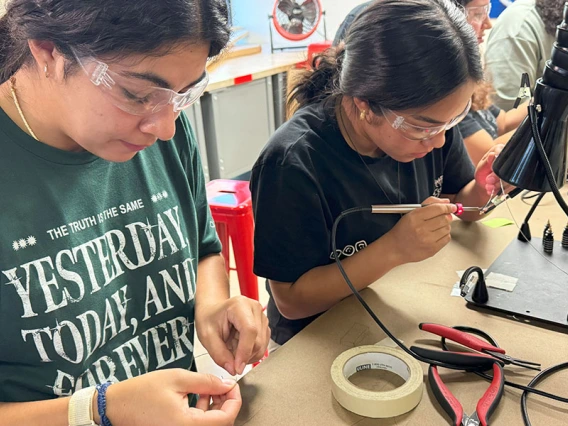Collaborating toward progress in engineering diversity
NSF regional hub membership augments College of Engineering support programs for underrepresented students.

Esteban Macias and Lily Hall are part of ENGAGED, a suite of programs the college introduced in 2016 to help University of Arizona students succeed in engineering.
Women and people from diverse ethnic and cultural backgrounds are underrepresented in the engineering workforce and its educational pathways. The numbers lag despite significant investments from public and private funders and companies that rely on the talents of diverse workers, according to the National Science Foundation.
“You’d think, with all the efforts put into it, the issue would be solved. But it’s not,” said Kathleen Melde, University of Arizona College of Engineering associate dean of faculty affairs and inclusion.
To actively address diversity disparities, the college has joined NSF’s new Western regional hub for the Engineering PLUS alliance.
In its quest for “transformative, systemic and sustainable change,” the NSF aims to increase engineering degrees awarded in the United States to women and students from minority groups. The goal is 100,000 undergraduate degrees in 2026 from 2021’s total of 54,000 and 30,000 graduate degrees from 21,000.
The college will collaborate with hub members through discussions, tracking and data sharing of evidence-based practices. Around 20 universities and research centers have joined the hub so far. They’re located in Arizona, California, Idaho, Oregon and Washington.
“We're at the table with a larger group, focused on engineering,” said Melde. “We can start sharing data, and we'll have a network of people who can really help fast-track the college’s efforts.”
Success to share
Melde, also a professor of electrical and computer engineering, has been hearing since she obtained her bachelor’s degree in 1985: “You don’t look like an engineer.”
Since Melde graduated, the percentage of women earning engineering bachelor’s degrees has grown from 15% to 24%.
“It’s happening less; we’re definitely making progress,” said Melde, who has led the college’s diversity and inclusion efforts since 2020.
College leaders focus on hiring faculty members who represent the student population, supporting the efforts of clubs dedicated to cultural communities, and administering programs that help students succeed. Not only did the college see increased enrollment in 2023, the incoming class was also more diverse than the national average, with 33% women.
The UA will share with Western region peers the successes of ENGAGED, a suite of services for engineering undergraduates who face challenges such as being part of underrepresented groups or being the first in their families to attend college. The program has served 232 students since 2021.
Since ENGAGED began in 2016 with the Catapult First Year Experience, college leaders have seen strong retention outcomes for participants. An assessment found stronger persistence to the third year among ENGAGED students than students who are demographically similar but not part of the program. ENGAGED added the Engineering Blast Off summer program two years ago to further help incoming students make the college transition.
Encouraged to thrive
Alejandro Quijada, a solutions engineer for IBM, graduated in 2023 with a BS in mechanical engineering. He works with the company’s sales team to resolve client questions and ensure installations go smoothly.
“I like it. I get to do some of the technical stuff but still get to be client-facing,” he said.
Quijada became involved with Catapult in his first year. He was part of a cohort of students studying for the same classes and benefiting from the guidance of recent alumni and mentors.
“That was one of the biggest benefits I could have had,” said Quijada, who, like many ENGAGED students, became a mentor to younger students in his final years at the UA.
In addition to ENGAGED, the student chapter of the Society of Hispanic Professional Engineers – where Quijada served in officer roles, including executive vice president – was a huge part of his college experience. The group helped Quijada develop professional skills and meet other Hispanic engineers.
“I have nothing but love for SHPE. Without them, I don't think I’d be where I am now,” he said.
Quijada will represent IBM at SHPE’s fall 2024 annual national convention, where he secured his first internship.
“It’s a little full-circle moment,” said Quijada. At university meetings, he counsels SHPE students to become involved with clubs, programs and volunteer experiences early in their studies. He also strives to set an example.
“A lot of people in SHPE need encouragement sometimes,” he said. “It’s hard to go into engineering. It’s nice to go, ‘Hey, I grew up where you grew up. It's possible.’”
Growing with support
More than 800 students have joined the incoming class of 2024, up from last year’s total of 750.
“Sustainability of growth is really important to me,” said Melde, adding that this is a great time to join the Engineering PLUS alliance.
Melde not only plans to grow the college’s undergraduate support programs, but also incorporate insights from the alliance to benefit more graduate students. She wants to establish initiatives that extend the kind of mentoring experiences Quijada had with SHPE and Catapult.
Support from peer mentors and those at the next academic stage could help address the national issue of underrepresented students leaving engineering education at the graduate level, Melde said. For example, first-year faculty could advise PhD students and postdoctoral researchers on how to present at conferences and obtain grant funding.
“Inclusion means people bring you into the group. And you feel safe in that space, and you grow together,” said Melde.



